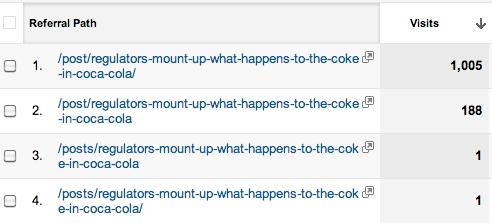Writing for Exposure: What Publishers Should Promise When They Aren’t Paying
It’s been almost a week and Twitter is still abuzz over the issue of publishers not paying writers, but instead promising “exposure” to their audience. (If you haven’t been following, google “Nate Thayer The Atlantic” — I won’t waste anyone’s time recapping it here.)
I’ve written for exposure a lot over the last two years. I write for free to gain exposure for Now I Know, and more specifically, for subscribers. Most of that “writing” is just me letting other places republish my work, but sometimes there’s a bit of editing involved, reworking, or combining of things.
My goal is to gain subscribers for my Now I Know email newsletter. I’ve come up with a series of requests I make of the publisher, which began with the awesome people at mental_floss, who understood that goal when I first wrote for them and helped me come up with ways to maximize that. What do I ask for? (a) A series of clear, call-to-action language, explaining why the publisher’s readers should subscribe to Now I Know; and (b) a promise/explanation of how the publisher focus their audience on my article.
Most of the places I’ve written for have done both of those, but in two cases — Business Insider and Huffington Post — they haven’t, really. I knew that going in and I do not want to cast aspersions here. Both were entirely professional and forthcoming about how they intended to promote my piece (i.e. give me exposure beyond the resume line) and even though it didn’t meet my normal requests, I chose to experiment. Both experiments went as well as you’d expect, which is to say not well at all.
GOOD vs. Business Insider
About a year ago, GOOD republished five articles of mine. That relationship was the product of a healthy back and forth between me and an editor there, describing how they’d promote the article and how the links to Now I Know would look. The first article, here, has sent over about 1,200 visitors since, as evidenced below.

After that article ran, Business Insider approached me and asked if me for permission to republish the same article. I tried to get them to engage on the same questions I asked of GOOD, but it wasn’t happening. I figured I’d say yes as a test. They have a much larger audience than GOOD, and if they could drive traffic, great. But I realized that was very unlikely, as their audience is fragmented across their site and unless I received prominent placement, it wouldn’t be worth it for me.
A year later, the results proved that BI wasn’t worth my time at all:

That’s 115 visits. About 100 of them are from this article, which is the same as the GOOD one (and incorrectly states that the article originally appeared at GOOD).
Smithsonian Magazine v. Huffington Post
In January, Smithsonian Magazine republished an article of mine about Kraft’s use of patents to protect their mac and cheese shapes. This wasn’t the first piece I’ve had there, but it did well, sending 1,000 or so readers to my landing page:

The Smithsonian relationship developed the same way as the mental_floss and GOOD one, and works similarly.
A day or so later a HuffPo editor approached me about republishing that article. HuffPo and BI’s business models are similar, and I approached the conversation with the HuffPo editor like I did the BI one. In the end, the article ran, again as an experiment in my eyes.
The results:

Not terrible, honestly, but not really great. And not really worth the work to get another one in the system, especially because I don’t have much if anything of a relationship with an editor there, so I don’t know if my next piece will get anywhere near that much (“much”) exposure.
“Exposure” is an amorphous, oddly-defined or undefined term. It probably makes very little sense for a full-time freelancer to give the Atlantic a 1,200 word cutdown of a longer piece for free, as a one-time exposure to a subset of their audience is not very valuable to the writer. On the other hand, if the Atlantic were to offer a freelancer a week-long stint blogging for one of its more visible areas, that sounds good.
In my case? If HuffPo or BI were to come back to me and ask for another piece, I’d say yes — but I’d condition it on them providing the article the traffic I know they can provide if they choose to. If they ask why, I’ll send them here. And if they so no to that condition, they won’t get my permission. It can be worth it for me to write for them, but by default, isn’t.
Originally published on March 10, 2013